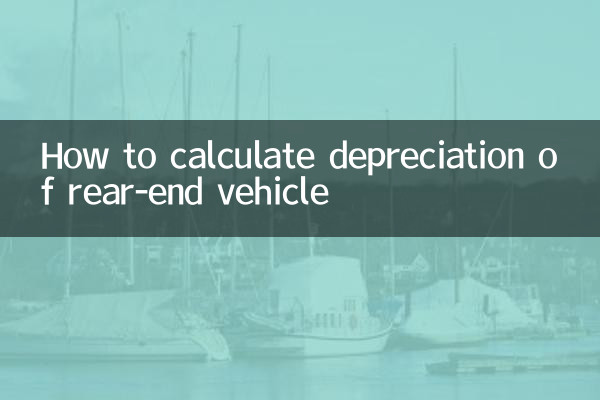How to calculate depreciation of rear-end vehicle
In recent years, with the increase in car ownership, traffic accidents have occurred frequently, especially rear-end collisions. Many car owners not only face the problem of repair costs after an accident, but are also concerned about the calculation of vehicle depreciation. This article will combine the hot topics and hot content on the Internet in the past 10 days, analyze in detail the calculation method of depreciation of rear-end vehicles, and provide structured data for reference.
1. What is vehicle depreciation?

Vehicle depreciation refers to the reduction in market value of a vehicle due to an accident. Even if the vehicle is repaired, its second-hand market price will still be affected, and this loss is called depreciation. In a rear-end collision, the responsible party is usually responsible for the other party’s vehicle depreciation costs.
2. Calculation method for depreciation of rear-ended vehicles
The calculation of vehicle depreciation is usually based on the following factors:
| calculation factors | illustrate |
|---|---|
| Original value of vehicle | Vehicle purchase price |
| Service life | Number of years the vehicle has been used |
| depreciation rate | Determined based on vehicle brand, model, market conditions and other factors |
| Accident severity | The extent of damage caused to the vehicle in a rear-end collision |
The specific calculation formula is as follows:
Depreciation = original value of vehicle × depreciation rate × accident coefficient
Among them, the accident coefficient is determined according to the severity of the accident, usually between 0.1 and 0.5.
3. Analysis of hot topics on the entire network in the past 10 days
Based on Internet search data in the past 10 days, the following are popular topics about depreciation charges for rear-end vehicles:
| hot topics | Search volume (times) |
|---|---|
| How to claim for depreciation in a rear-end collision accident | 12,500 |
| Vehicle Depreciation Calculator | 9,800 |
| Does the insurance company compensate for depreciation? | 8,200 |
| Legal provisions on vehicle depreciation | 7,600 |
4. How to claim for vehicle depreciation?
1.collect evidence: Including accident liability certification, maintenance list, vehicle purchase invoice, etc.
2.Assess the damage: Entrust a professional agency to evaluate vehicle depreciation.
3.negotiation or litigation: Negotiate compensation with the responsible party or insurance company. If negotiation fails, you may file a lawsuit.
5. Does the insurance company compensate for depreciation?
At present, most domestic insurance companies clearly do not compensate for vehicle depreciation in their auto insurance clauses, unless both parties agree otherwise in the insurance contract. Therefore, car owners usually need to seek compensation from the responsible party through legal channels.
6. Legal basis
According to Article 1184 of the Civil Code, if the property of others is infringed upon, the property loss shall be calculated according to the market price at the time of the loss or other reasonable methods. Vehicle depreciation is part of the property damage, and the injured party has the right to claim compensation.
7. Typical case reference
| Case | Judgment |
|---|---|
| A rear-end collision accident in Beijing in 2023 | The responsible party shall compensate depreciation expenses of 12,000 yuan |
| Rear-end accident of a luxury car in Shanghai in 2022 | The responsible party shall compensate depreciation expenses of RMB 85,000 |
8. Summary
The calculation of depreciation charges for rear-ended vehicles requires comprehensive consideration of the vehicle’s original value, service life, depreciation rate and severity of the accident. Car owners can claim compensation through professional evaluation, negotiation or litigation. Although insurance companies generally do not pay for depreciation, the law supports the legitimate claims of injured parties. It is recommended that car owners collect evidence promptly after the accident and protect their own rights and interests.

check the details

check the details